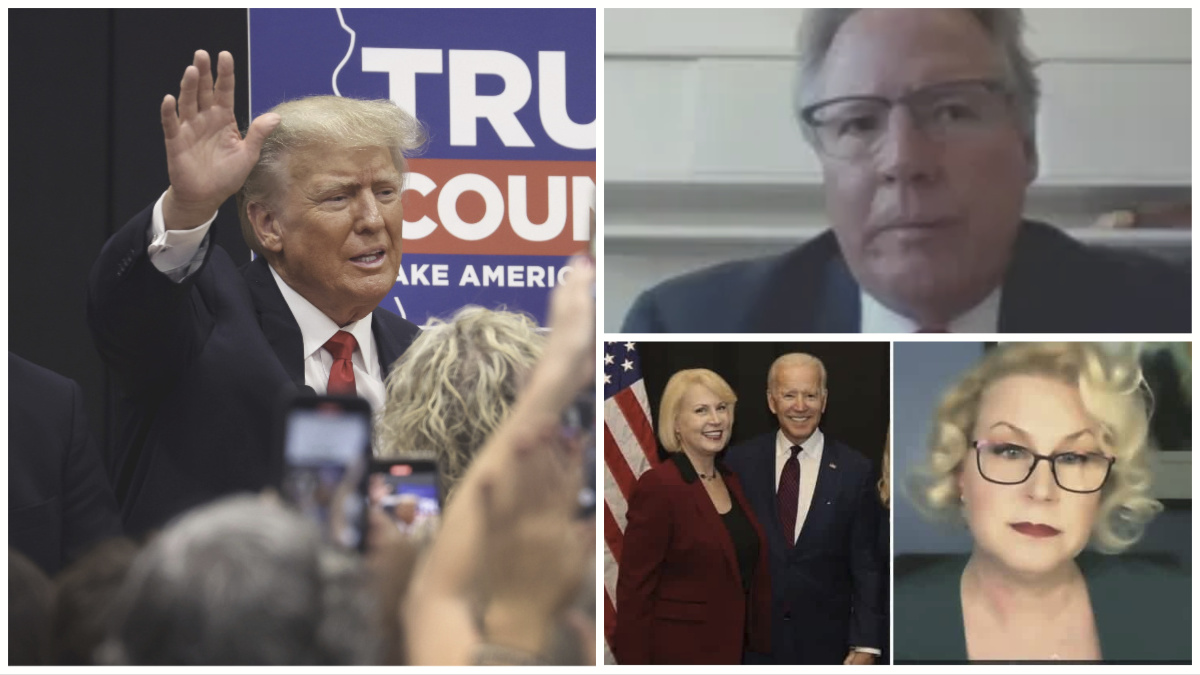This post originally appeared at https://www.wisconsinrightnow.com/wec-trump-ballot-access/

The partisan Wisconsin Election Commission will consider a “proposed emergency rule” on Thursday morning that some Republicans believe is designed to make it easier for the left to attempt to keep President Donald Trump off the Wisconsin ballot, an action that, if successful, could determine the presidency.
Bob Spindell, a Republican appointee to the Wisconsin Election Commission (WEC) raised the alarm on the new rule in an email.
“This proposed Emergency Rule could presumedly Permit the Wis Election Commissioners and / or Clerks to either ‘Allow or Deny’ Ballot Access to any & All Candidate for Reasons / Judgements other than Mechanical, such as the ‘Character,’ of the Candidate, etc.!” Spindell wrote.
Wisconsin Democratic Attorney General Josh Kaul said on audio late this month that it “remains to be seen” whether former President Donald Trump, who is leading in Republican primary polls, will be allowed on the Wisconsin ballot, appearing to reference a law review article that argues Trump should be denied access to state ballots based on the 14th Amendment.
Those wishing to weigh in on the new rule can attend the meeting via Zoom at 10 a.m. on September 6, 2023. You can join here.
Meeting Code ID:846 0289 2850
Pass Code, if Necessary 584741
If that doesn’t work, join by phone:
1-312-626-6799
Meeting Code ID: 846 0289 2850
Pass Code, if Necessary 584741
Here’s the problem with new ballot access rules. The partisan WEC is deadlocked 3-3. What happens to a candidate’s ballot access in the case of a deadlock is a matter of legal dispute. The WEC has kicked major candidates off the ballot before- most notably in 2020, when the Green Party’s candidates were denied ballot access after WEC deadlocked over a flimsy nomination paper challenge. Two of the WEC members are major Joe Biden donors.
There is a growing drumbeat on the left to attempt to disqualify Trump from state ballots using the 14th Amendment. It’s expected this issue could end up before the U.S. Supreme Court.
The materials for the open meeting are confusing and written in legalize.
“The proposed rule would create a clear administrative process for an individual to challenge any aspect of a candidate’s sworn Declaration of Candidacy, but not their nomination papers,” the documents state.
“The challenge to the Declaration of Candidacy would be brought to the Commission, or to the local filing officer. The proposed
rule would identify the legal grounds for bringing these types of challenges by incorporating or cross-referencing the appropriate provisions in § 8.21, § 8.30, or both. The proposed rule would also describe the procedures by which the Commission or filing officer hear and decide these complaints, as well as the ability of an individual to seek review of the Commission’s or filing officer’s decision on their complaint.”
There is “currently no clear administrative or statutory process for an individual to challenge the validity or sufficiency of a candidate’s Declaration of Candidacy, which includes challenges to the candidate’s sworn certification that he or she meets or will meet the applicable requirements for holding office. In the administrative code, Rule EL 2.07 only explicitly applies to challenges to nomination papers,” the documents say.
They note: “Ballot access challenges have historically been more prevalent during general election cycles, and there is no reason to believe that 2024 will be an exception. Recent challenge periods have highlighted the need to modernize, more explicitly detail, and more carefully craft administrative rule language pertaining to ballot access so that all candidates and potential challengers, as well as the general public, have a clear understanding of the rules and procedures applicable to ballot access challenges.”
According to the WEC documents, “The proposed rule should minimize the risk that a candidate is improperly granted, or denied, ballot access by providing clear procedures for how the Commission and local filing officers would hear and decide nomination paper challenges.”
The drumbeat to keep Trump off state ballots started among a group of law professors, including Trump critics and a prominent liberal professor, who are weaving a foundation for ballot access challenges relating to the 14th Amendment. It won’t matter if Trump is kicked off the ballot in blue states. He won’t win them anyway.
The real game will be to kick him off the ballot in a red state (won’t happen) or (and here’s where we come in) a battleground state, of which there are few.
However, some legal experts we spoke to believe that any effort to keep Trump off the Wisconsin ballot due to the 14th Amendment would have to be brought in federal court because it’s a constitutional question. They don’t believe the state Election Commission would have any authority. There is legal dispute over this, however.
“A lawsuit alleging that Trump is disqualified could be filed in state or federal court against the relevant election officials,” WILL’s Dan Lennington previously told WRN. “Multiple lawsuits in multiple states could be a nightmare for Trump, causing him to incur massive attorney fees. While some believe these lawsuits would all be removed to the federal system and decided by the Supreme Court, I think that is far from certain.”
The key passage in the 14th Amendment bans former civilian or military officials from holding office if they “shall have engaged in insurrection or rebellion” against the United States government. It was created in the wake of the Civil War to prevent former Confederates from becoming president or controlling Congress.
There are several obvious problems with applying this to Trump:
Was Jan. 6 really an “insurrection” or “rebellion”? Trump and many conservatives would argue no.
What’s the definition of “insurrection” or “rebellion”? Unclear.
Did Trump HIMSELF really engage in those things? He and many conservatives would argue no.
Even Jack Smith didn’t charge Trump with “insurrection.”
Does the 14th Amendment require a conviction?
Doesn’t Trump have free speech rights?
These are serious questions that the conservative-controlled United States Supreme Court will probably have to answer.